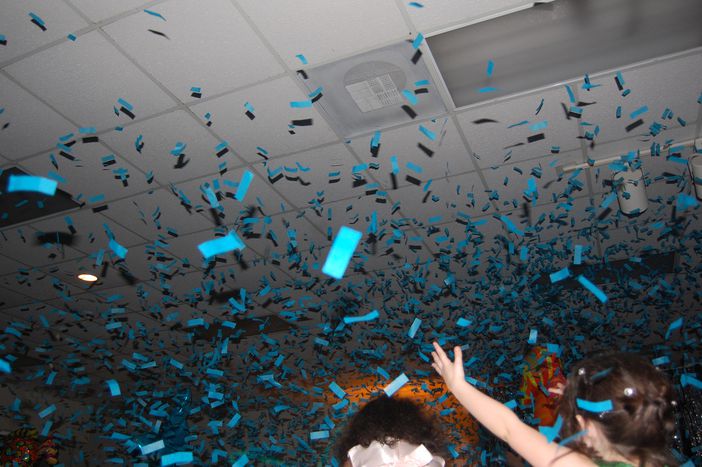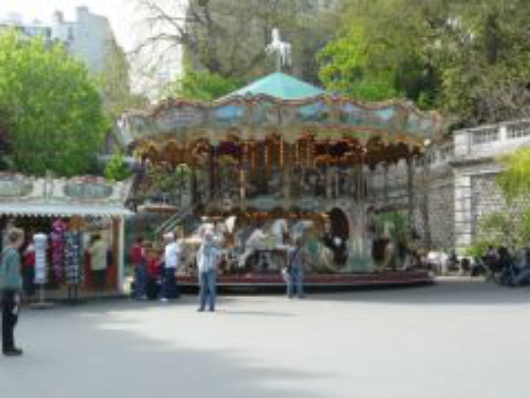
Eurogeneration : May 9th celebrated by the Parisian team
Published on
On the eve of the European Day, the Parisian team took the streets of Paris to put a test on strollers from any nationality and of every age, asking them about their attachment to this Europe which has taken so much space in our 21st century societies.
Holding a camera used as a film maker, carrying an MP3 player-recorder for sound-catching, and with their spring days’ good mood, your devoted blog-journalists stormed the Butte Montmartre. It is down this very Parisian site, also cherished by tourists, that our generation tour began.
Revealing: Exchanges, trips, tourism, these are the first things that come to our interviewees’ mind when we talk about Europe, no matter their age bracket.
The first group we approach is composed of boys and girls, rather young. After a first chat to introduce our subject, and once the surprise over, we learn that these three boys and four girls, 20 years old or so, are having a tourist journey in the French capital. One of them studies at the European school in Luxembourg; amazing for a first shoot, isn’t it?
Amused, two of them play the game: ”Well, if I say Europe, does it mean anything to you?” Of course, for these youngsters studying in buildings that can mingle up to 27 different nationalities, Europe is obvious. Instinctively, Morgane and Yann refer to the Erasmus program
Our second “target”, in her thirties, is far less favourable to this European Union that she first of all considers as an economic and political union. She says she doesn’t feel European as she doesn’t travel a lot. Then, mobility seems to be a key factor of the “European profile”. That’s what this young real estate agent, laying against his agency front door and holding a cigarette says : Europe is also a place of communication. Be able to move, yes, but being able to communicate with one another, it means enabling people to share their perceptions of daily life and to enrich our cultures.
The benefice isn’t only commercial nor financial, it is above all human. But what about politics…
So broad but also so close, Europe took the bet made in the 50’s: it became a space of free movement and free trade. For young people, the free-boarder Europe is both a geographic and a psychological asset. But there is also this inner feeling amongst young Europeans that their future will be multiple. Nevertheless, this benevolence doesn’t quite the critical minds of the youngests who underline the lack of political unity. As the success of the functional agenda doesn’t need to be proved of anymore, we should better ask ourselves about the possibility to reach a real political Europe. Is it only desirable? The young generation remains rather sceptical even if, regarding the last Eurobarometer or Ipsos opinion surveys, the 20-35 year-old-people show the highest confidence rate in the EU.
English, this link that gets us to understand each other …?
 To communicate with each other, one should not deny it, Europeans have rallied themselves behind the English language. This is also characteristic of the gap between us and our grandparents’ generation, or even our parents’, for whom learning English was a luxury reserved to elite. And that’s what sometimes strengthens defying reactions.
To communicate with each other, one should not deny it, Europeans have rallied themselves behind the English language. This is also characteristic of the gap between us and our grandparents’ generation, or even our parents’, for whom learning English was a luxury reserved to elite. And that’s what sometimes strengthens defying reactions.
Our young thirty or so woman and her friend recognize that it permits young people to have exchanges, but that it should not be at the expense of cultural diversity nor at the expense of differences.
Should English be an unavoidable common denominator to solve the European equation? Not so obvious when we see that English people who should, at least, fell galvanized by this prevailing position on the language market, look down upon at Europe. Once more, we don’t speak out of impressions but we base ourselves on real facts. Till now, we hided many of our inquiry failures, but I can’t resist on the pleasure of revealing an anecdote which will confirm this European reality: We nabbed a couple of freshly retired people marked with the tourist’s stamp ( socks, sandals, a fisherman’s hat for him, a pair of Abba fashion-like and shorts for her, not missing the camera slung across the shoulder). We quickly realised they were not French as they grimaced their face with incredulity to our first questions. However, one word seemed to mean something as we uttered it: “Europe”. And there, shields up. Mister X turned around without giving the impression to feel sorry for not answering back, and Mrs X shyly followed the pace (some taboos cannot be spoken out). Of course, our less cooperative tourists, for not saying rebellious, were British! So, though we don’t have the intention to make “English-bashing”, one should recognise that our friends from across the Channel do not count among the friendliest people towards Europeans.
If our approach often surprised, we happened to be surprised by people too.
Like this couple of free-huggers, standing down the Sacré Coeur with their board. After exchanging a friendly hug, they told us that Europe was a good thing. A community that hugs and kisses, maybe this is the real European identity. And why not developing a transnational free-hugger collective action to symbolise this? Idea’s launched; let’s hope that our two palls will take it over…
Amazing too this bench of septuagenarians. They might have reached 400 years old allall in all! Moreover, they all came from different countries: Italy, Spain, France. They said they were used to have their daily meeting in this lively place to share a moment together, among the Parisian turmoil. They should be the more talkative – who would’ve bet?! Even if they content quickly got mixed up. “It is too widely opened” one of them told us. Having come to France approximately 40 years ago to escape Spain undergoing, at the time, hard economic, employment and life conditions, she said she felt completely French now. It was just when free circulation of goods and people had been implemented in Europe that our French-hearted Spanish woman, started to hope for a better future. However, listening to her, we should close both the inner and the outer boarders of Europe now. Immigration, protectionism, insecurity, idleness; here was how she considered the surrounding world. A point of view that was not shared by her fellow Spanish friend who was sitting next to her. “It is only because we were given the opportunity to leave our country to work in France that we succeeded in our lives; we can’t neither forbid nor reproach the others for willing to improve their daily life”.
These confronted views among a generation of people that went through the same experience is interesting. It shows that there is not just one community of common destinies depending on generations but that within each generation, personal experiences fuel multiple individual destinies. “Europe” does not erase everything, it doesn’t add things either; but it is a way to unify behind a single word the differences that will make its future.
Let’s celebrate Europe!
Sophie Helbert



